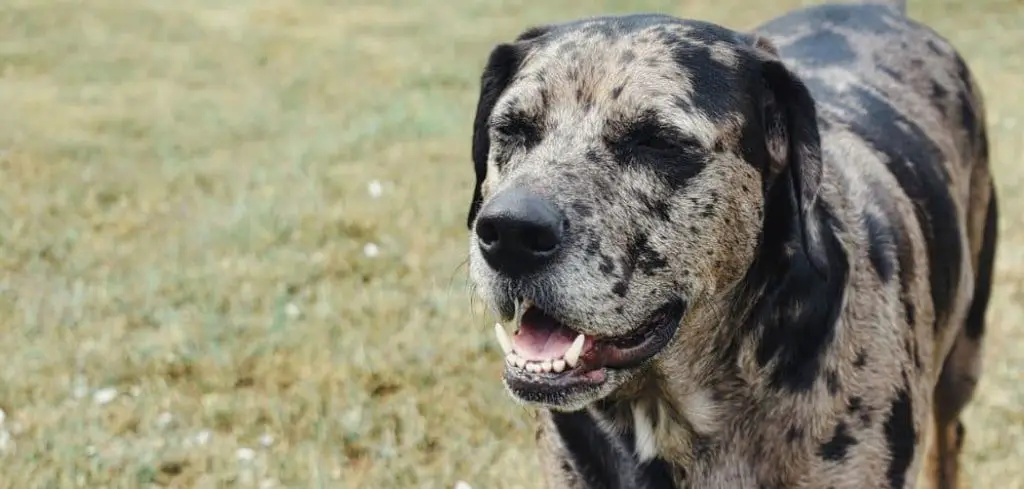Dogs panting while repeatedly opening and closing their mouths can be concerning for any dog owner. This behavior may indicate that your dog is uncomfortable or struggling to regulate body temperature.
We outline the common reasons why a dog may pant and open and close its mouth, what you can do at home, and when to seek veterinary help.
Dog Panting and Opening and Closing Mouth — Why It Happens
When a dog pants while repeatedly opening and closing its mouth, it can be a sign of discomfort, nausea, or dental problems. Dogs sometimes do this to try to relieve irritation in the throat, gums, or teeth, or if something is stuck in the mouth.
It can also point to stress, overheating, or even neurological issues if it persists.

Dog Panting and Opening and Closing Mouth: Common Causes
Heat or Overheating
Heat or overheating is a frequent cause of panting with mouth movement. When a dog cannot cool itself efficiently, it will pant rapidly while opening and closing its mouth to increase airflow and release heat.
Symptoms include drooling, red or flushed gums, lethargy, and reluctance to move. Heatstroke can progress quickly, making early recognition and intervention critical.
Read more: Dog Panting and Mouth Open (Here’s why)
Oral or Dental Pain
Pain in the mouth, teeth, or gums can cause repeated opening and closing. Dental disease, infections, broken teeth, or gum inflammation often leads to discomfort and abnormal mouth movements.
Other signs may include drooling, pawing at the mouth, decreased appetite, or bad breath.
Untreated dental issues can worsen and lead to systemic infections, so veterinary attention is essential.
Respiratory Distress
Difficulty breathing can trigger panting along with mouth movements. Conditions like brachycephalic airway syndrome, tracheal collapse, or respiratory infections may cause dogs to open and close their mouths in an attempt to get enough oxygen.
Look for labored breathing, coughing, wheezing, or blue-tinged gums. Prompt evaluation by a veterinarian is critical, especially for dogs prone to airway issues.
Nausea or Gastrointestinal Upset
Feeling nauseous or experiencing stomach upset can lead to panting and mouth movements. Dogs often drool, lick their lips, and repeatedly open and close their mouths when they feel queasy.
Additional signs may include vomiting, decreased appetite, or abdominal discomfort. Identifying and addressing the underlying cause is important to prevent dehydration or further illness.
Anxiety or Stress
Emotional stress can cause panting and mouth movements. Dogs may exhibit repetitive behaviors like opening and closing their mouths when anxious, nervous, or overstimulated.
Other behaviors can include pacing, whining, shaking, or clinging to their owner. Providing a calm environment and reassurance can help, but chronic anxiety may require professional guidance.
Pain or Discomfort Elsewhere in the Body
General pain or discomfort can trigger mouth movements and panting. Dogs may open and close their mouths in response to joint pain, injury, or internal discomfort.
Signs include reluctance to move, limping, restlessness, or changes in posture. Prompt veterinary assessment can identify the source and allow effective pain management.
Medication Side Effects or Toxicity
Certain medications or accidental ingestion of toxins can cause panting and abnormal mouth movements.
Drugs affecting the nervous system or metabolism, as well as toxic foods or chemicals, can lead to these symptoms.
Watch for vomiting, diarrhea, lethargy, drooling, or seizures. Immediate veterinary care is critical if poisoning or medication reaction is suspected.
What to Do If Your Dog Is Panting and Opening and Closing Their Mouth
Move your dog to a cool, shaded area if overheating is suspected. Avoid placing them in direct sunlight or on hot surfaces.
Offer small amounts of water frequently, but do not force your dog to drink large volumes at once.
Check your dog’s mouth for obvious signs of dental pain, swelling, or foreign objects. If discomfort is present, contact your veterinarian.
Keep your dog calm and quiet, minimizing stress or triggers that may worsen anxiety-related panting.
Monitor your dog’s breathing, gum color, and overall responsiveness. If symptoms worsen or persist, seek veterinary attention promptly.
When to Call or Visit Your Vet
Contact your veterinarian immediately if your dog exhibits:
Persistent or worsening panting with repeated mouth movements
Collapse, weakness, or disorientation
Drooling, vomiting, or signs of nausea
Labored or noisy breathing, blue or pale gums
Signs of severe pain, injury, or dental problems
Early intervention can prevent complications and address underlying health issues effectively.
Read more: Dog Panting and Moaning (Here’s why)
Key Takeaway
Panting along with opening and closing the mouth can signal heat stress, dental pain, respiratory issues, nausea, anxiety, or general discomfort. While some causes are mild, others can be life-threatening.
Observing your dog closely, keeping them comfortable, and seeking veterinary care when necessary ensures their safety and well-being.
Acting promptly can prevent serious complications and help your dog recover comfortably.
